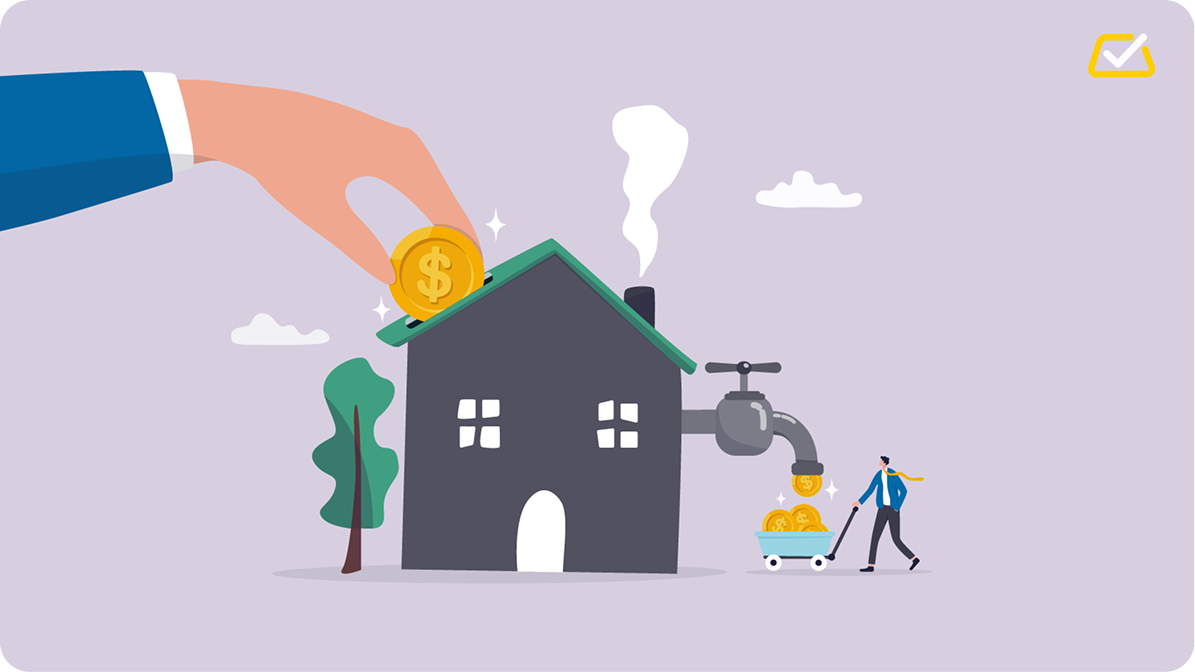Key Takeways:
Money that works for you.
That’s the goal, isn’t it?
A reliable source of second income can change everything. Build wealth. Save up for retirement. Plan a family vacation.
But what comes to mind when we talk about a way of generating a second income?
Work more hours? Start a side gig? Launch another business? Pick up more shifts? But let’s be honest, grinding 24/7 isn’t sustainable. Most people don’t have that kind of time or energy.
Fortunately, there’s a smarter way to generate additional income. It’s called “passive income.”
What is passive income?
Imagine you’re just sitting at home having a relaxed afternoon when you get a notification from your bank: “£100 credited to your account,” and you didn’t have to lift a finger for it. That’s essentially what passive income is.
How does passive income work?
Passive income is money you make without actively working for it every day. Instead of trading time for money like you would do in a typical job, passive income lets you earn while you sleep, travel or spend time with your loved ones.
Why is passive income important? Passive income can offer you financial freedom and stability. It’s like a backup plan for unexpected expenses or a job loss. More importantly, it contributes to your long-term wealth by allowing you to reinvest your earnings, creating a snowball effect over time.
This kind of income comes in regularly—monthly, quarterly or even yearly—depending on the nature of the investment or income source.
There are many ways to generate a passive income. Some examples are dividends from Shariah-compliant stocks, royalties from intellectual properties like books or media content and rental income from real estate.
In this article, we will break down how real estate can be a good way to start earning passive income.
Real estate as a source of passive income:
Amongst all the ways to generate passive income, real estate holds a special place in many investors' portfolios. It is safe to say that most wealthy people have at least some of their money invested in real estate.
So, how can you actually make money from real estate?
.png)
When managed well, income from real estate can be made in two ways:
- Regular rental income from tenants.
- Long-term appreciation in property value.
If you pick the right property in a good area, you can enjoy a regular stream of rent while watching the property’s value grow over time. Properties in neighbourhoods with strong prospects—like upcoming developments, new amenities or improved infrastructure—often see an increase in both rental income and resale value.
Wahed Real Estate is the shariah-compliant investment platform for real estate, allowing people to passively invest in high-yielding properties in the UK.
Wahed Real Estate is the shariah-compliant investment platform for real estate, allowing people to passively invest in high-yielding properties in the UK.
Active vs. passive real estate investing: What’s better for you?
When it comes to property investment, you have two main approaches to choose from: active and passive real estate investments. Let's discuss what each means for you as an investor.
Active real estate investing:
Active investing involves a more hands-on approach when it comes to managing the investment and dealing with the property and tenants. Your responsibilities start with researching the market and securing a suitable property. This includes being hands-on with all the due diligence, negotiations with the seller, conveyancing, surveying and the paperwork. Not to mention that if renovations are needed, you will need to coordinate and fund the costs yourself.
But the work doesn’t stop after you secure the property. As an active investor, you’re handling all day-to-day operations including tenant selection. That means finding dependable tenants who pay on time and treat your property with care. You will also be responsible for those 3 AM emergency calls about burst pipes, backed-up toilets or malfunctioning appliances.
Overall, if you are someone who likes to have complete control over your investment, be more engaged and ultimately take on all the risk, you may prefer the active investment option.
However, it's important to note that this option isn't for everyone, as it necessitates in-depth market understanding and knowledge of landlord-tenant legislations. It also demands significant time commitment, capital and effort to actively manage a property, which can make it difficult to grow and diversify your portfolio.
.png)
Passive real estate investing:
If you prefer not to deal with the day-to-day obligations of property management, passive investing in real estate might be a better fit. This option allows you to enjoy the benefits of property ownership whilst completely avoiding the property management headaches.
There are numerous ways to invest passively in real estate. Here are a few examples:

Property manager:
You own the property but hire professionals to handle daily operations and manage the property on your behalf. They may charge a fixed monthly fee or a percentage of rental income for their services.
Real Estate Investment Trusts (REITs):
REITs are the companies that own and operate income-generating real estate assets like apartments, shopping malls or offices. REITs operate a bit like mutual funds where the firms pool money from investors to buy and manage real estate rather than stocks or bonds.
While they offer low entry barriers, many use interest-bearing loans, making them unsuitable for Muslim investors looking for Shariah-compliant property investment opportunities.
Real estate crowdfunding:
This investment model lets you pool your money with other investors to purchase properties collectively. A crowdfunding platform usually scouts the market to find good properties, analyses their prospective returns, and if satisfied with the return profile, advertises the properties on the platform for investors to invest in.
Once the money is raised, the platform completes the purchase process and manages the property throughout the investment period, handling acquisition, maintenance and tenant relationships.
The investor’s return depends on the share of their investment. For example, if someone invests 20% of the total amount raised, they’d receive 20% of the net rental income after expenses.
Wahed Real Estate is the shariah-compliant investment platform for real estate, allowing people to passively invest in high-yielding properties in the UK.
Wahed Real Estate is the shariah-compliant investment platform for real estate, allowing people to passively invest in high-yielding properties in the UK.
Why choose passive real estate investing?
Less time commitment:
Passive investing removes the burden of day-to-day operations. There's no need to handle property maintenance, tenant issues or administrative tasks.
No dealing with tenants:
No midnight calls about broken pipes or chasing late rent payments - someone else takes care of all that for you.
Lower barrier to entry:
You won’t be needing hundreds of thousands for a down payment. When investing in real estate through crowdfunding platforms, you can start investing with much less. By pooling money with other investors, you get access to properties that might otherwise be out of reach.
Easy to invest:
Gone are the days when real estate investing meant becoming a part-time property manager. Today's platforms make investing as simple as a few clicks. You can review opportunities, make investment decisions and monitor performance through user-friendly interfaces.
Predictable cash flow:
While no return is guaranteed, passive property investing typically offers predictable returns through regular dividend payments, allowing investors to generate a passive income stream without the hands-on work.
Portfolio diversification:
Rather than concentrating risk in a single property, you can spread your risk by investing smaller amounts across multiple properties. This can help you manage risk while maintaining exposure to the real estate market.
Wahed Real Estate is the shariah-compliant investment platform for real estate, allowing people to passively invest in high-yielding properties in the UK.
Wahed Real Estate is the shariah-compliant investment platform for real estate, allowing people to passively invest in high-yielding properties in the UK.
Wahed Real Estate is the shariah-compliant investment platform for real estate, allowing people to passively invest in high-yielding properties in the UK.
What to look out for when choosing passive real estate investing?
Limited Control:
With passive investing, you surrender direct control over management decisions or how the property is being run. While professionals handle these aspects, if you’re the one who likes to call the shots, the lack of control can be frustrating.
Potentially lower returns:
As you’re paying others to do the work for you, your returns may be lower than active investing. Fees are paid to property managers and platform operators.
Shariah compliance considerations:
Most REITs or crowdfunding platforms finance the properties using interest-bearing bank loans, which would make the investment impermissible for Muslim investors since it involves riba (interest). For this, you’ll need to do extra homework to find fully Shariah-compliant options.
Is real estate the best way to earn passive income?
Real estate is often seen as a good option for generating passive income because of regular monthly rental payments.
Besides, one of the key advantages of real estate is that it’s a physical asset. Unlike stocks or cryptocurrencies, which you cannot see or touch, properties are tangible. You can walk through a house, inspect its condition and identify ways to improve its value. This generally makes it an easier investment type to understand and invest in.
That said, there’s no single investment type that is universally "best" - each comes with its own set of advantages and risks. It’s all about finding what best fits your investment objectives and risk profile.
Investing in real estate with Wahed:
If you are an investor looking to invest in real estate but wish to avoid:
- Dealing with Riba
- Managing the hassle of a property
- Dealing with tenants
- Putting in a large capital to buy a full property
then Wahed is the right place for you!

At Wahed, we are on a mission to make Shariah-compliant property investing more accessible to the Muslim community in the UK. We use our real estate expertise and exclusive access to the real estate market in the UK to source and rent out properties.
We take on the burden of managing the property and paperwork, as well as dealing with tenants, so that you can sit back and relax and watch your investments appreciate in value over time.
Your journey with us is straightforward: invest in our carefully selected properties and receive a potential quarterly rental income proportional to your investment share, all without lifting a finger.
Most importantly, we ensure that all our real estate investment opportunities are completely Shariah-compliant. By purchasing properties directly with cash, we avoid any debt financing, which guarantees that your investment remains free from riba at every step.
Check out our investment calculator to determine how much passive income you could potentially earn from your investments.
Start your real estate investment journey with Wahed today.
Wahed Real Estate is the shariah-compliant investment platform for real estate, allowing people to passively invest in high-yielding properties in the UK.














